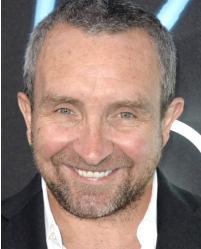On this date in 1968, English actor Edward Maurice Charles Marsan was born in London’s East End, where he was raised. “My dad was a truck driver. My mum was a school dinner lady. Just solidly working class across the board. I served an apprenticeship as a printer, and then when I passed my apprenticeship, my boss, who was an alcoholic, said ‘In twenty years time, you can be where I am.’ ” (The Hollywood Interview, Dec. 8, 2008)
Though he’d left school at age 16 for the apprenticeship, that was not a future Marsan envisioned. He graduated in 1991 from the Mountview Academy of Theatre Arts and studied further at the Kogan Academy of Dramatic Arts. “I always knew I was interested in acting and would watch a lot of movies with my dad, who had very good taste in actors: Robert Duvall, Rod Steiger, Gene Hackman. … When I was a kid, a lot of young actors I knew would watch ‘On the Waterfront’ and study Marlon Brando’s performance, but I was always watching Rod Steiger, thinking that this guy is the real deal.” (Ibid.)
Marsan’s first television appearance, of which he has had many, was in 1992. He appeared in over 80 episodes from 2013-20 of all seven seasons of “Ray Donovan,” an American crime drama whose pilot episode broke Showtime viewership records. His film debut was in “The Man Who Knew Too Little,” a 1997 spy comedy starring Bill Murray. His movie roles include the main villain in the 2008 superhero film “Hancock” alongside Will Smith and as Inspector Lestrade in Guy Ritchie’s “Sherlock Holmes.”
His other films include “Gangs of New York,” “21 Grams,” “V for Vendetta,” “Miami Vice,” “Mission: Impossible III” and “Vera Drake” (2004), for which he won the British Independent Film Award for Best Supporting Actor. It tells the story of a working-class woman in 1950 who performs illegal abortions. He has been in three movies with Charlize Theron, including “Atomic Blonde” (2017).
Marsan appeared in 2021 as a Jewish anti-fascist activist in the four-part BBC-TV adaptation of the novel “Ridley Road.” He was subjected to what he called “relentless” anti-semitic abuse online. “[A]ll I did was play a Jew, I dread to think what would’ve happened if I was actually Jewish,” he tweeted. (Times of Israel, Oct. 16, 2021)
The British Humanist Association named him a Patron in 2015. “Our Patrons are talented individuals who have, in one way or another, made real contributions to the cultural, intellectual, or scientific progress of our species, just as humanists have done throughout history. Whether it’s by helping raise awareness of our campaigning work or by assisting us to promote public understanding of Humanism, our Patrons lend us the visibility and impact we need to achieve our aim of a secular state ensuring human rights and equality for all.” (British Humanist Association, Nov. 11, 2015)
On X, formerly known as Twitter, Marsan’s tagline is “Nothing human is alien to me.” Terence. (Publius Terentius Afer, playwright during the Roman Republic) “I see all these people talking about acting as a great spiritual thing,” says a quote attributed to Marsan on the Internet Movie Database. “It’s not. There’s no great mystery to acting. It’s a very simple thing to do but you have to work hard at it. It’s about asking questions and using your imagination.”
He married make-up artist Janine Schneider in 2002. They have four children: Tilly, Blue, Bodie and Rufus Marsan.
PHOTO: Marsan at the 2017 premiere for “Atomic Blonde” at The Theatre at Ace Hotel, Los Angeles; photo by shutterstock.com/Jaguar PS.


